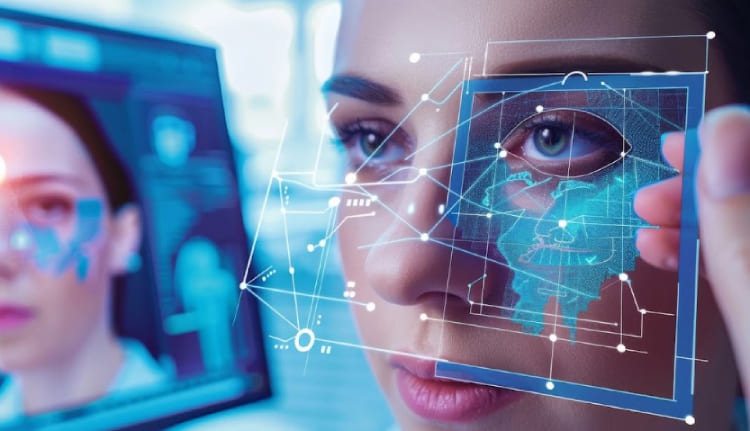
@ShahidNShah


The field of dermatology is undergoing a remarkable transformation with artificial intelligence (AI). This innovative technology is revolutionizing the way skin diseases are diagnosed, offering unprecedented accuracy, efficiency, and accessibility. As skin conditions are among the most common health issues worldwide, the impact of AI in dermatology and other dermatology trends hold significant promise for improving patient outcomes and streamlining healthcare processes.
Artificial intelligence, particularly machine learning (ML) and deep learning (DL) algorithms, have seen rapid advancements in recent years. These technologies analyze big data, identify patterns and make predictions with remarkable precision. In dermatology, AI systems are being trained to recognize and classify skin conditions from medical images, enabling faster and more accurate diagnoses.
Beyond diagnosing skin conditions, AI is also making strides in cosmetic dermatology. For instance, AI-driven tools can personalize botox treatment plans by analyzing individual skin types, facial structures, and muscle movements. This ensures that treatments are tailored to each patient’s unique needs, enhancing the effectiveness and safety of procedures.
One of the most significant benefits of AI in dermatology is its potential to enhance diagnostic accuracy. Traditional methods rely heavily on the expertise and experience of dermatologists, which can vary widely. AI, on the other hand, provides consistent and objective analysis, alongisde digital dermatology.
Studies have shown that AI algorithms can achieve high diagnostic accuracy comparable to, and in some cases surpassing, that of experienced dermatologists. For instance, a study published in the journal Nature demonstrated that a deep learning algorithm could identify skin cancers with a level of accuracy equivalent to that of board-certified dermatologists.
AI-powered diagnostic tools can process and analyze images much faster than humans for analyzing skin lesions, acne treatment, and other skin concerns. This speed is particularly beneficial in clinical settings, where timely diagnosis is crucial for effective treatment.
By rapidly identifying skin conditions, AI can help reduce the waiting time for patients and alleviate the burden on dermatologists. This efficiency also allows for the possibility of early detection, which is vital for conditions like melanoma, where early intervention can significantly improve patient outcomes.
AI makes dermatological care more accessible. In many parts of the world, access to specialized dermatological care is limited. AI-powered mobile applications and teledermatology platforms are bridging this gap by allowing patients to upload images of their skin conditions for remote analysis.

These tools can provide preliminary assessments and guide patients on whether they need to seek further medical attention. Individuals in remote and underserved areas where access to healthcare professionals is scarce can benefit from this technology.
Beyond diagnosis, AI is also aiding in the development of personalized treatment plans. By analyzing patient data, including medical history, genetic information, and lifestyle factors, AI can help dermatologists tailor treatments to individual patients.
This can improve the effectiveness of skin treatments and lower the risk of adverse reactions. For example, AI can predict how a patient might respond to a particular medication based on their unique genetic makeup, helping dermatologists choose the most suitable treatment options.
Despite its immense potential, AI integrating services in dermatology is not without challenges. One significant concern is the quality and diversity of the data used to train AI algorithms.
For AI to be effective, it needs to be trained on large, diverse datasets that represent different skin types and conditions. However, many current datasets lack sufficient diversity, which can lead to biased algorithms that perform poorly on underrepresented populations.
Looking ahead, the future of AI in dermatology is promising. Continued advancements in AI technology, combined with increased collaboration between technology companies, healthcare providers, and regulatory bodies, will likely lead to the development of more sophisticated and reliable diagnostic tools. Additionally, as more diverse datasets become available, the accuracy and fairness of AI algorithms will improve, making them more effective for a broader range of patients.
AI is also expected to play a significant role in dermatological research. By analyzing large datasets, AI can help identify new patterns and correlations that might lead to a better understanding of skin diseases and the development of novel treatments. Furthermore, AI-driven research can accelerate the discovery of new biomarkers and therapeutic targets, paving the way for innovative treatment approaches.
The integration of AI in dermatology is transforming the landscape of skin disease diagnosis and treatment. With its ability to enhance diagnostic accuracy, improve efficiency, and increase accessibility, AI holds significant promise for advancing dermatological care. As technology evolves, the partnership between dermatology and AI will yield remarkable benefits for patients and healthcare providers. Knowing these dermatology trends ensures proper skin care and prompt treatment of skin issues using digital tools and advanced dermatology practices.

Imagine you wake up feeling unwell, but the nearest doctor is a grueling two-hour drive away. This reality faces millions living in rural areas, where geographical barriers and a scarcity of …
Posted Jul 16, 2024 Telemedicine Healthcare Innovation Healthcare
Connecting innovation decision makers to authoritative information, institutions, people and insights.
Medigy accurately delivers healthcare and technology information, news and insight from around the world.
Medigy surfaces the world's best crowdsourced health tech offerings with social interactions and peer reviews.
© 2025 Netspective Foundation, Inc. All Rights Reserved.
Built on Apr 17, 2025 at 6:07am